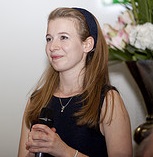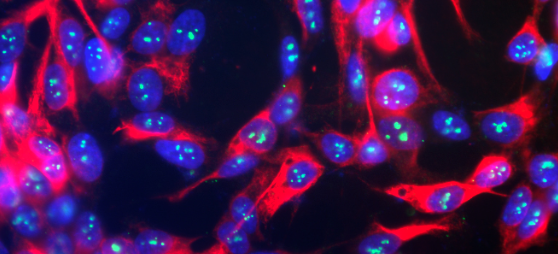Elisa D’Arcangelo, SSRA Gold medalist: ”Tell your story and don’t fluff it up to much”

”I suppose there is a whole series of challenges in this competition throughout its stages. Most of all however, the task to be mastered is, in my opinion, telling a good story of scientific discovery, well-prepared, professional and, most of all, captivating.”
”Sincerity is appreciated in science!” says Elisa D’Arcangelo, winner of the Student Summer Research Awards (SSRA) Gold medal at University College Dublin. Elisa was told that the adjudication panel was impressed by her honesty in commenting strengths and weaknesses of her study, without trying to impress.
Apart from lectures and lab sessions as part of university modules, the School of Medicine and Medical Sciences in UCD also offers some hands-on lab experience during the summer. This is called the UCD Summer Student Research Competition (SSRA) and the title pretty much sums it up. Medical, biomedical and radiography students are selected to work as part of research teams on a whole range of areas (from research on breast cancer to diabetes to bioinformatics). After 10 weeks they present their work in form of a scientific poster and—if selected—a short PowerPoint presentation. In both rounds of the adjudication process—poster and presentation—the work carried out is considered by a panel of experts (researchers and physicians).
Congratulations! How did you prepare yourself for the communication part?
My project was a bioinformatics project (Bioinformatic analysis of myc-n binding sites in myc-n overexpressing neuroblastoma sh-sy5y cells) which is an area that can sound pretty dry compared to other techniques. Thats why I made sure that with my presentation I put my work into the bigger picture. I tried to sort of ’zoom out’ of the details of my individual work and to use my project as a means to convey the scientific story. Also, I wanted my presentation to sound as natural as possible, so I didn’t learn off a ’script’; by having the line-up of ideas clear in my head, I was able to freely chat about it, which—I think—showed that I really knew what I was talking about.
What three tips would you give to other early career scientists who want to excel during competitions of this kind?
• Keep it easy to follow: the less you focus on technicalities, the more the audience will listen to your story.
• Keep it visually captivating: if you use PowerPoint, get rid of text, even all words, use pictures and animations. They are easy to make and say so much more than text on the screen.
• Talk freely: even if you won’t talk perfectly, this will show your true knowledge and confidence in your research. Pre-prepared presentations sometimes sound sterile and because of nervousness and pressure you can easily be thrown off and loose track of what you are saying.
What do you think was the crucial detail in your success?
I think the crucial detail was one I didn’t plan for at all. I was told afterwards that what most impressed the adjudication panel was my sincerity in presenting my findings; it seemed that what was appreciated most was that I didn’t approach the competition as such. Apparently, what turned out to be the winning card was my honesty in commenting strengths and weaknesses of my findings and approach without trying to impress. So that was lucky!
This insight was a true lesson that I will carry with me and that will certainly be of great use during my career: tell your story and don’t fluff it up to much; sincerity is appreciated in science!
Elisa about her studies
”I moved from Italy to Dublin directly after completing secondary school and I have been in Ireland for the past four years, studying at University College Dublin. Here I am doing a BSc. in Biomedical Health and Life Sciences. The course is intense and varied; quite demanding but a lot of fun. Right now I am finishing up: the thesis being submitted, there are just six more exams to endure and my final year too will be behind me.”
- Claire Price of Crastina receives outreach award from Royal Society of Biology - October 25, 2020
- Agile Science student project at Brussels Engineering School ECAM: “We can’t wait to try it again!” - August 28, 2020
- Create an infographic in the Lifeology SciArt Infographic Challenge - June 16, 2020
- Adam Ruben – The scientist that teaches undergraduate students comedy - March 27, 2020
- Sam Gregson, Bad Boy of Science: “Comedy helps to bridge the gap” - March 10, 2020
- The Coolest Science Merchandise of 2019 - December 16, 2019
- Science Media Centre (UK) offers guide on dealing with online harassment in academia - November 26, 2019
- Agile project management taught to students and researchers at Karolinska Institutet - September 20, 2019
- Stefan Jansson: Improve your credibility! (Crastina Column, September 2019) - September 6, 2019
- The People’s Poet: Silke Kramprich, tech communicator - August 31, 2019




Trackbacks & Pingbacks
[…] Elisa D’Arcangelo, SSRA Gold medalist: ”Tell your story and don’t fluff it up to much” […]
Leave a Reply
Want to join the discussion?Feel free to contribute!